The following is part of our project “Increasing Access to Justice for Older Adult Victims of Sexual Assault: A Capacity Building Approach”, funded by the Justice Canada Victims Fund.Learn more about this project or consult the full list of resources
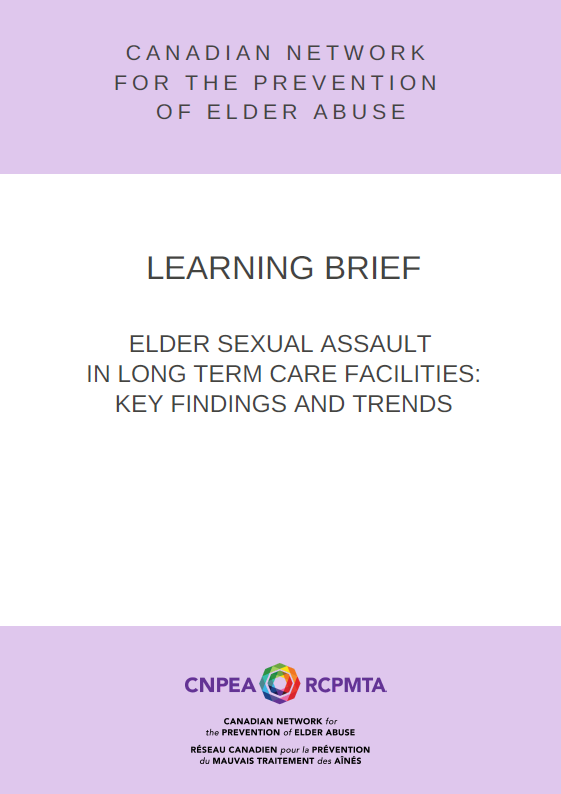 This Learning Brief is part of a set developed for the Access to Justice Project.
This Learning Brief is part of a set developed for the Access to Justice Project.
As our population continues to age, it is estimated that the demand for LTC beds will increase 10-fold by 2030, underscoring the need for a comprehensive understanding of the unique vulnerabilities for and consequences of sexual abuse in LTC settings. The following mini literature review provides a brief synthesis of the research and current knowledge on the sexual victimization of older adults in long-term supportive care settings.
Companion piece: Learning Brief: Sexual Assault in Long Term Care Facilities - Recommendations for Research, Policy and Practice
Authors:
Amy Peirone, PhD, SSHRC Postdoctoral Fellow, University of Guelph
Myrna Dawson, PhD, Professor of Sociology, University of Guelph, Director, Centre for the Study of Social and Legal Responses to Violence
The following is part of our project “Increasing Access to Justice for Older Adult Victims of Sexual Assault: A Capacity Building Approach”, funded by the Justice Canada Victims Fund.Learn more about this project or consult the full list of resources
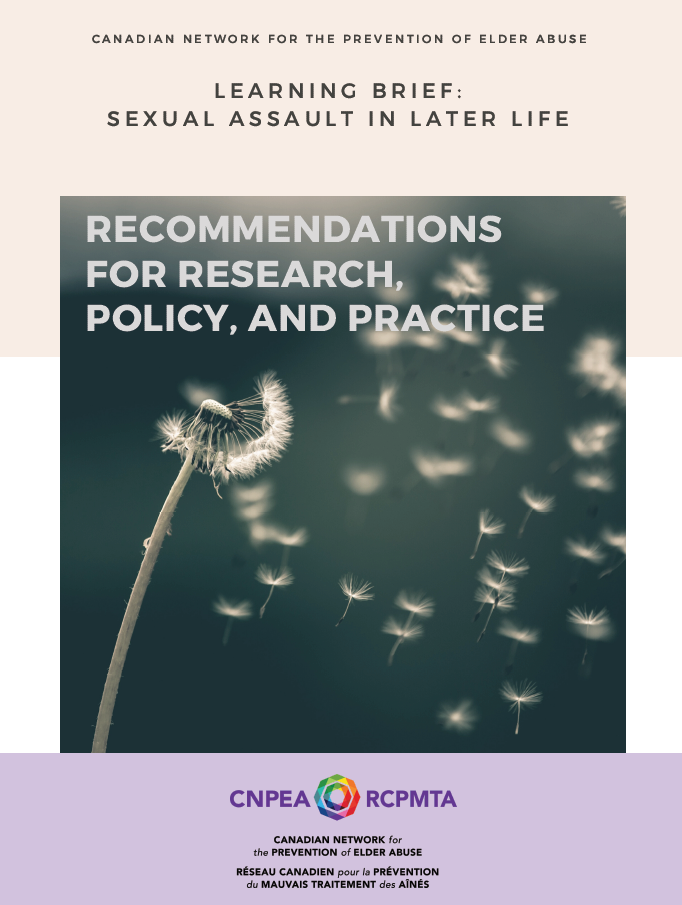 This Learning Brief is part of a series developed for our Access to Justice Project.
This Learning Brief is part of a series developed for our Access to Justice Project.
The available literature provides several suggestions for the identification, prevention, and intervention of sexual violence in later life. These suggestions are typically categorized into recommendations for future research, policy, and practice.
While research studies on sexual violence in later life come from multiple areas of study (e.g., elder abuse, sexual violence, intimate partner violence), and are conducted with different samples using different methodologies, underscoring the bulk of recommendations and suggestions across studies is the need to focus on sexual abuse in older age as distinct from other forms of abuse, and as distinct from sexual violence in younger victims.
Distinguishing between types of abuse, and viewing sexual victimization as a distinct victimization experience can facilitate the development and implementation of appropriate prevention and intervention strategies and approaches that are attentive to the unique needs of older persons and older victim-survivors.
Companion piece: Learning Brief: Sexual Assault in Later Life - Mini LIterature Review
Authors:
Amy Peirone, PhD, SSHRC Postdoctoral Fellow, University of Guelph
Myrna Dawson, PhD, Professor of Sociology, University of Guelph, Director,Centre for the Study of Social and Legal Responses to Violence
The following is part of our project “Increasing Access to Justice for Older Adult Victims of Sexual Assault: A Capacity Building Approach”, funded by the Justice Canada Victims Fund.Learn more about this project or consult the full list of resources
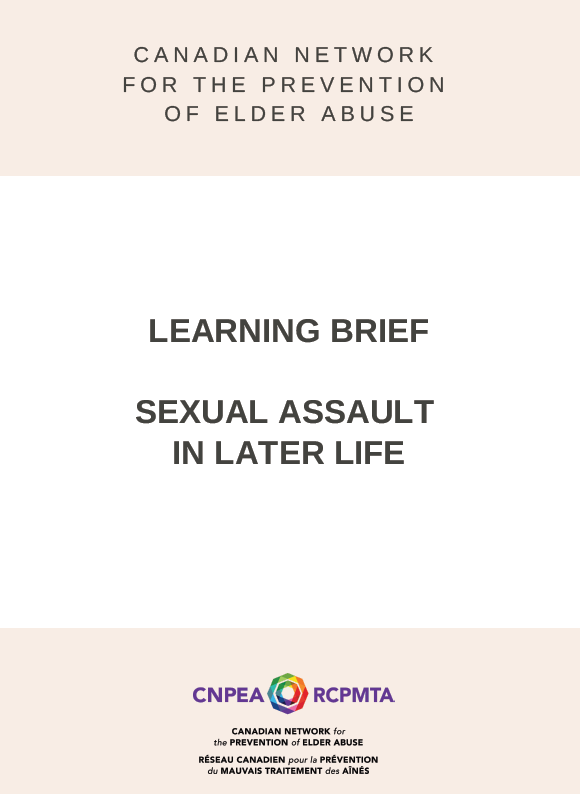 This Learning Brief is part of a series developed during our Access to Justice Project. It provides an overview of the literature and knowledge base on sexual assault in later life. It is designed to provide a summary of what we know about sexual victimization in older age, including why it should be viewed as distinct from sexual assault experienced by younger adults as well as from other forms of elder abuse, and identifies some key gaps in our knowledge and understanding of sexual assault in later life.
This Learning Brief is part of a series developed during our Access to Justice Project. It provides an overview of the literature and knowledge base on sexual assault in later life. It is designed to provide a summary of what we know about sexual victimization in older age, including why it should be viewed as distinct from sexual assault experienced by younger adults as well as from other forms of elder abuse, and identifies some key gaps in our knowledge and understanding of sexual assault in later life.
Companion piece: Sexual Assault in Later Life- Recommendations for Research, Policy, and Practice
Authors: Amy Peirone, PhD SSHRC Postdoctoral Fellow, University of Guelph and Myrna Dawson, PhD Professor of Sociology, University of Guelph Director, Centre for the Study of Social and Legal Responses to Violence
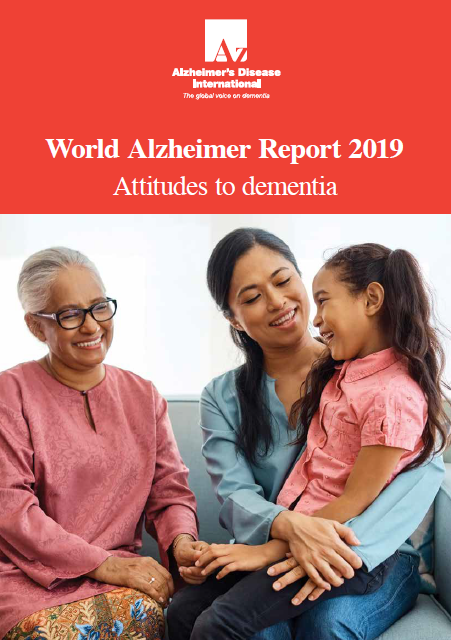 "In this 2019 World Alzheimer Report, we revisit attitudesto dementia and stigma to better understand the role they play and to set a baseline against which we can gauge future changes. This report details the scale of the challenge we face where attitudes to dementia, and specifically stigma, are still a major barrier to people seeking out information, help, advice, support and even a diagnosis; preventing or delaying people from putting plans in place; progressing to a stage of acceptance and being able to adjust to live with dementia. Stigma may be overt; in some countries it is still associated with witchcraft resulting in people being restrained and isolated. Or it can be more subtle; even in countries with national dementia plans and profile awareness campaigns, many people still delay seeking help when they first become aware that something is wrong."
"In this 2019 World Alzheimer Report, we revisit attitudesto dementia and stigma to better understand the role they play and to set a baseline against which we can gauge future changes. This report details the scale of the challenge we face where attitudes to dementia, and specifically stigma, are still a major barrier to people seeking out information, help, advice, support and even a diagnosis; preventing or delaying people from putting plans in place; progressing to a stage of acceptance and being able to adjust to live with dementia. Stigma may be overt; in some countries it is still associated with witchcraft resulting in people being restrained and isolated. Or it can be more subtle; even in countries with national dementia plans and profile awareness campaigns, many people still delay seeking help when they first become aware that something is wrong."
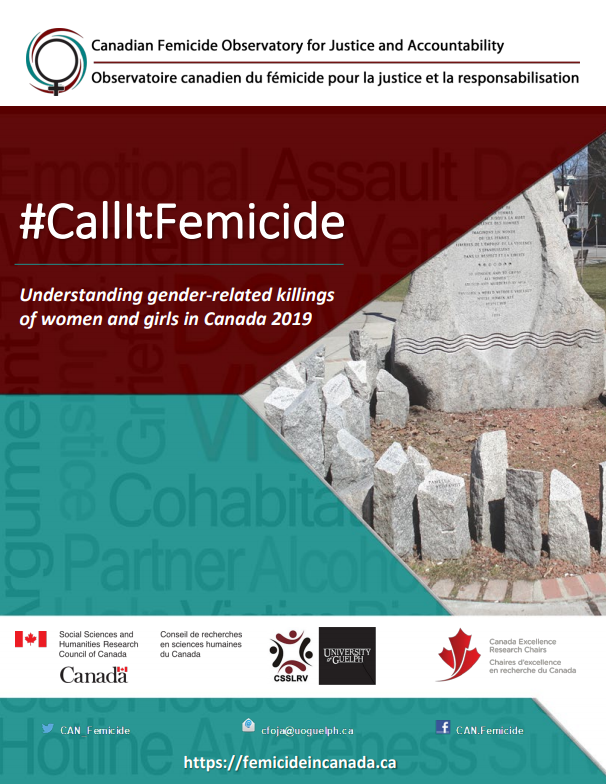 ''The Canadian Femicide Observatory for Justice and Accountability (CFOJA) is the sole Canadian initiative responding to the United Nations call to establish femicide observatories to more compreensively and accurately document gender-related killings of women and girls or 'femicide'. The CFOJA mandate is to establish a visible and national focus on femicide in Canada by (1) documenting femicides as they occur in Canada; and (2) monitoring state, legal and social responses to these killings. This is the CFOJA's second annual #CallItFemicide report, focusing on women and girls killed by violence in Canada from January 1 to November 30, 2019.
''The Canadian Femicide Observatory for Justice and Accountability (CFOJA) is the sole Canadian initiative responding to the United Nations call to establish femicide observatories to more compreensively and accurately document gender-related killings of women and girls or 'femicide'. The CFOJA mandate is to establish a visible and national focus on femicide in Canada by (1) documenting femicides as they occur in Canada; and (2) monitoring state, legal and social responses to these killings. This is the CFOJA's second annual #CallItFemicide report, focusing on women and girls killed by violence in Canada from January 1 to November 30, 2019.
Contents:
- Section 1: The Growing Global Fem(in)icide Movement
- Section 2: Patterns in Women and Girls killed by violence in Canada
- Section 3: Identifying Gender-Relates Motives and Indicators for Femicide
- Section 4: Current and Emerging Research and Data Priorities for Femicide Prevention
- Section 5: Remembering Women and Girls Killed by Violence 2019
See the 2018 report
Source: Canadian Femicide Observatory for Justice and Accountability
Page 6 of 20
















